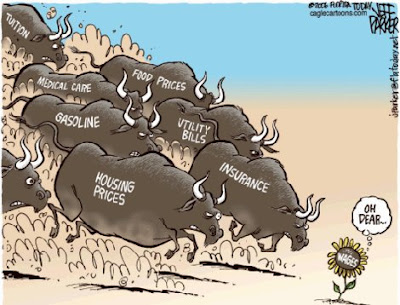0 comment Thursday, August 28, 2014 | admin

Bankers are buying up an obscure book, now being reprinted, about hyper-inflation and its ensuing horrors in the Weimar Republic. This can't be good.
Mr. Evans-Pritchard sets the scene:"Grand pianos became a currency of sorts as pauperized members of the civil service elites traded the symbols of their old status for a sack of potatoes and a side of bacon. There is a harrowing moment when each middle-class family first starts to undertand that its gilt-edged securities and War Loan will never recover. Irreversible ruin lies ahead. Elderly couples gassed themselves in their apartments. * * *Great numbers of people failed to see it coming. 'My relations and friends were stupid. They didn�t understand what inflation meant. Our solicitors were no better. My mother�s bank manager gave her appalling advice,' said one well-connected woman.
'You used to see the appearance of their flats gradually changing. One remembered where there used to be a picture or a carpet, or a secretaire. Eventually their rooms would be almost empty. Some of them begged -- not in the streets -- but by making casual visits. One knew too well what they had come for.'"Evans-Pritchard says we're not there yet. But,"But we should be careful of embracing the opposite and overly-reassuring assumption that this is a mild replay of Japan�s Lost Decade, that is to say a slow and largely benign slide into deflation as debt deleveraging exerts its discipline.
Japan was the world�s biggest external creditor when the Nikkei bubble burst twenty years ago. It had a private savings rate of 15pc of GDP. The Japanese people have gradually cut this rate to 2pc, cushioning the effects of the long slump. The Anglo-Saxons have no such cushion.
There is a clear temptation for the West to extricate itself from the errors of the Greenspan asset bubble, the Brown credit bubble, and the EMU sovereign bubble by stealth default through inflation. But that is a danger for later years. First we have the deflation shock of lives. Then -- and only then -- will central banks go too far and risk losing control over their printing experiment as velocity takes off. One problem at a time please."
Labels: Ambrose Evans-Pritchard, Hyper-Inflation, Money Supply, Velocity
